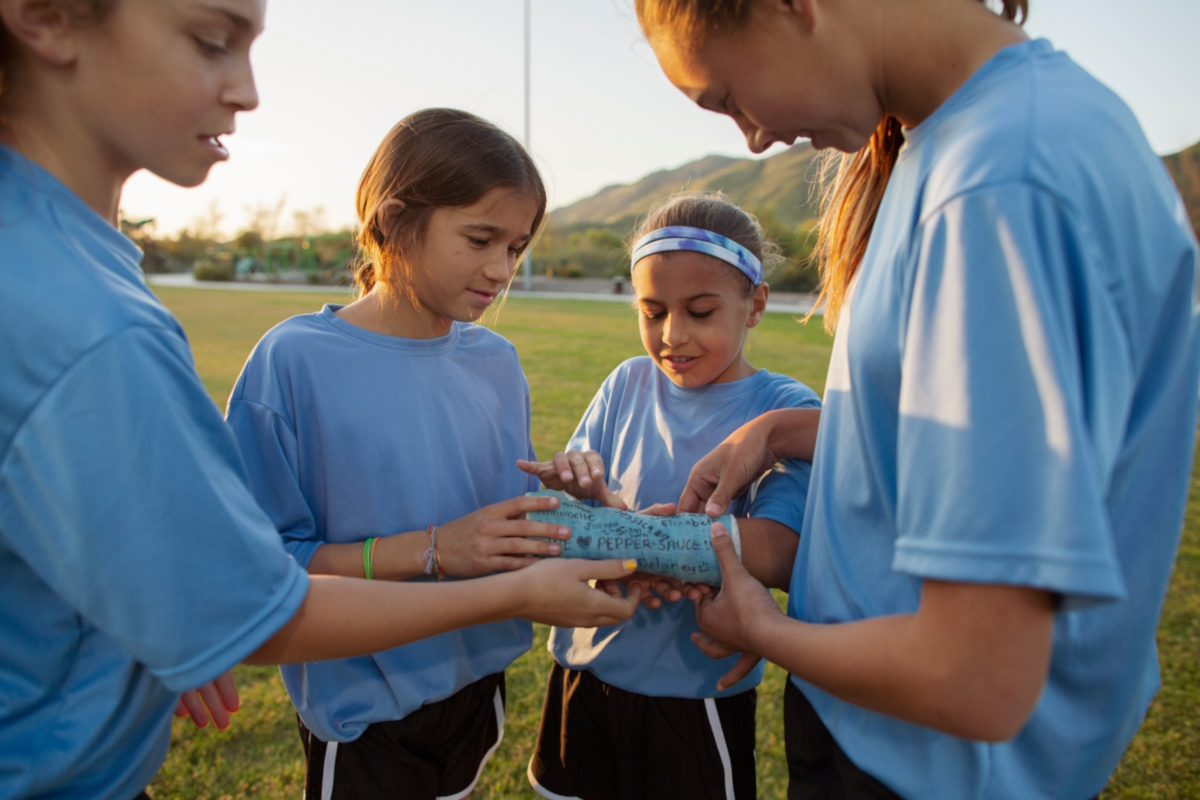Thousands of children throughout North Texas are headed back to school this month. It’s an annual event celebrated by teachers, parents, and yes even students. Unfortunately, back-to-school season also brings an increased threat of hand injuries. Accidents of all types and severity naturally tend to spike after the start of school, with more than 3.5 million children ages 14 and younger getting hurt annually playing sports or participating in recreational activities. And that’s not even including the thousands of children injured on playgrounds, in the classroom, during PE and recess, and even as they walk to and from school.
Our team of orthopedic doctors is committed to raising awareness of back-to-school injuries, especially those related to our specialty of arm, elbow, wrist, finger, and hand injuries. We want to help parents, teachers, coaches, and kids learn how to avoid hand injuries and recognize how necessary it is to seek medical help sooner rather than later.
Help Kids Avoid These Hand Injuries This Back-to-School Season
- Sprains, strains, and fractures
- Torn cartilage or tendon and ligament damage
- Lacerations and soft-tissue injuries
- Dislocations and separations
- Jammed fingers
- Crushing injuries
- Burns
- Nerve injury
- Puncture wounds

How Common Are School-Related Hand Injuries?
Over the past decade, more than 175,000 school injuries have resulted in hospital emergency room visits. Data provided by the Consumer Products Safety Commission’s National Electronic Injury Surveillance System also reveals that school injuries tend to occur more frequently at certain times of the year, particularly during the first few months of the school year as everyone adapts to new routines, higher levels of activity, and sports schedules.
From 2017 to 2019, 42% of the total injuries occurred after September 1st and at least seven of the 10 days with the most student emergency department visits each year fell in the fall.
A few common ways hand injuries happen during back-to-school season include but aren’t limited to the following:
- Sports-related accidents
- Improper equipment or playing surfaces
- Slip-and-fall accidents
- Fingers caught in doorjambs
- Playground injuries
- Overuse or misuse of a body part
- Playing through or ignoring pain
Whether your child or student sustained hand injuries in sports, while on the playground, during a slip-and-fall accident in the stairwell, or because their little hand got caught in a doorjamb, our job is to get them back to the classroom safely and quickly. We have advanced knowledge of performance and health, physical conditioning, and soft-tissue biomechanics. We also advise kids of all ages on everything from proper nutrition to injury prevention.

8 Tips To Keep Kids Safe from Hand Injuries
The reality is that kids are incredibly active, leading to minor to severe injuries at school, including sprains, strains, fractures, and more. As a result, hand injuries are practically unavoidable. However, there are general prevention strategies and awareness efforts you, as a parent, teacher, coach, or trained education professional, can do to help kids prevent, limit, and safely overcome hand injuries.
Here are a few safety tips to keep kids healthy and active this school year.
- Complete a physical exam before school starts — A physical exam conducted by your child’s pediatrician or general doctor ensures there aren’t any underlying conditions (past injuries, current weight, physical ability, etc.) that could put them at risk for hand injuries. If a doctor believes that playing a particular sport or participating in daily recess is not a good idea based on your child’s unique situation, they can suggest rehabilitation or alternative activities.
- Stretch and take breaks — Stretching helps decrease overall stiffness, increase blood flow throughout the body, and improve overall motion in your child’s joints. It also helps with muscle soreness and reduces the risk of tendon or muscle tears. This is excellent advice for sporty kids as well as those who are busy with everyday classroom activities and susceptible to repetitive stress hand injuries.
- Play smarter — The CPSC says that more than 206,000 children under the age of 16 are treated in hospital ERs across the U.S. for playground injuries. This can be prevented in numerous ways, including teaching kids about safety on the playground, installing age-appropriate equipment and properly designed playground layouts, and increasing supervision by a responsible adult who can enforce safety rules during high-activity events.
- Wear the right equipment — Football players wear protective gear such as gloves, tape, and splinting to prevent hand injuries. But regardless of which sport your child plays, ensure their equipment is being worn and fits them properly. When equipment doesn’t fit correctly (oversized or undersized), is too old, or hasn’t been adequately maintained or certified for competition, the risk of hand injuries and other trauma increases dramatically. This is also true with previous injuries, as proper equipment helps avoid the possibility of causing additional injury.
- Remove tripping and slipping hazards — School officials should be mindful of anything that could cause an accident. This includes removing tree stumps and rocks from playgrounds and putting up “wet floor” signs after mopping hallways, classrooms, bathrooms, and stairs.
- Limit classroom disruption and “horsing around” — You’d be surprised how many hand injuries could be avoided if kids didn’t horse around in class. Hand injuries can happen for a variety of reasons in the classroom, including puncture wounds due to misuse of scissors, kids getting their hands crushed in a doorjamb or between desks, etc.
- Limit how much your child wears jewelry — Rings, bracelets, etc., can get caught on gym or playground equipment or cause a freak accident. Everyone loves jewelry, but it’s best not to wear it to school. If your child insists on wearing it, advise them to take it off during athletic or recreational activities.
- Don’t ignore hand injuries — Don’t ignore existing hand injuries; visit an orthopedic surgeon as soon as possible. Our Fort Worth sports medicine orthopedic doctors will do a thorough exam. They will want to know as much as possible about the injury. This includes how it happened, how long ago it happened, the specific areas where your child is experiencing pain, and how it has affected their ability to complete everyday tasks.

Fort Worth Hand Center Can Help With Hand Injuries
No one wants their child to experience hand injuries or any type of injury. Back-to-school season is supposed to be an exciting time. However, accidents happen, and when they do, you need someone to turn to for help.
Our patient-centered approach helps you find the treatment that works for your child’s and family’s needs, goals, and lifestyle. From fingertips to elbows, Fort Worth Hand Center offers expert diagnosis of injuries, chronic conditions, and degenerative diseases. Conservative treatment methods are typically advised first, but if surgery is needed, you can be rest assured that our orthopedic surgeons are among the best in Fort Worth.
To find out about your treatment options call 817-877-3277 to schedule an appointment or complete the form below.
"*" indicates required fields
Prior to starting any new treatment or if you have questions regarding a medical condition, always seek the advice of your doctor or other qualified health provider. This information is not a substitute for professional medical advice.
Fort Worth Hand Center serves the DFW area, including North Richland Hills, Pantego, Pelican Bay, Richland Hills, River Oaks, Saginaw, Sansom Park, Southlake, Trophy Club, Watauga, Westlake, Westover Hills, Westworth Village, White Settlement, Arlington, Azle, Bedford, Benbrook, Blue Mound, Burleson, Colleyville, Crowley, Dallas, Dalworthington Gardens, Edgecliff Village, Euless, Everman, Flower Mound, Forest Hill, Fort Worth, Grand Prairie, Grapevine, Haltom City, Haslet, Hurst, Keller, Kennedale, Lakeside, Lake Worth, Mansfield, Newark, and all of North Texas.
*Patient names and/or photos may be changed to protect patient confidentiality.



